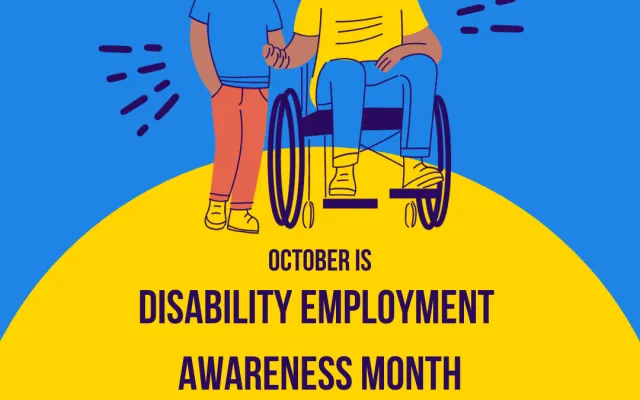Disability Employment Awareness Month
Disability Employment Awareness Month
October is the National Disability Employment Awareness Month (DEAM). Disability Employment Awareness Month brings to the forefront the challenges that persons with disabilities encounter when seeking and retaining employment. This month also creates awareness, access and opportunity for a group of individuals who may go unnoticed in ableist organizational and social cultures.
Disability is another key dimension of diversity that we must examine as we work towards building an inclusive campus. As part of the work to build accessible and inclusive spaces, organizations must provide reasonable accommodation to employees and the public. Accommodation is also about ensuring a balance of the rights of the individual and the organization.
As the Accessibility, Belonging and Community team, the first part of our work consists of increasing awareness and understanding about disabilities and accessibility with an intent to grow institutional capacity. In collaboration with key campus stakeholders, the second part of our work is to build a comprehensive framework for disability and accessibility on campus.
ULethbridge alum Lionel Migrino (BMgt '22) is an advocate for people with disabilities and shares his difficulties finding employment with CBC News.
Accessible Learning Centre
The University of Lethbridge Accessible Learning Centre facilitates equitable learning supports in the university environment for students with a wide range of documented disabilities.
FAQ
Persons with disabilities include those who have long-term physical, mental, intellectual or sensory impairments which in interaction with various barriers, may hinder their full and effective participation in society on an equal basis with others.1
In Canada, 22.3% of the population has at least one disability. In Alberta, 24.6% of females have disabilities, compared to 18.8% of males.2
1 United Nations (2006) Convention on the Rights of Persons with Disabilities and Optional Protocol.
2 Statistics Canada (2021) Canadian Survey on Disability, 2017: Data Visualization Tool.
- Addiction (e.g. alcohol, drugs, gambling)
- Chronic condition (e.g. epilepsy, cystic fibrosis, diabetes, multiple sclerosis)
- Developmental disability (e.g. autism, Down syndrome)
- Learning disability (e.g. dyslexia, attention deficit hyperactivity disorder (ADHD))
- Mental Health condition (e.g. schizophrenia, depression, anxiety, PTSD)
- Physical disability (e.g. cerebral palsy, spinal cord injury, amputation)
- Sensory disability (e.g. hearing or vision loss)
An “ableist” belief system often underlies negative attitudes, stereotypes and stigma toward people with disabilities. “Ableism” refers to attitudes in society that devalue and limit the potential of persons with disabilities.1
1 Ontario Human Rights commission (n.d.) What is disability?
Accommodation for disability is required by law to eliminate barriers to employment and enable all employees to realize their potential and contribute fully.
The duty to accommodate means that sometimes it is necessary to treat someone differently in order to be fair. For example, asking all job applicants to pass a written test may not be fair to a person with a visual disability. In such cases, the duty to accommodate may require that alternative arrangements be made to ensure full participation of a person or group. (Canadian Human Rights Commission).
The United Nations Convention on the Rights of Persons with Disabilities, adopted in 2006, and signed by Canada in 2010, represented moving from viewing persons with disabilities as “objects” of charity, medical treatment and social protection towards viewing persons with disabilities as “subjects” with rights, who are capable of claiming those rights and making decisions for their lives based on their free and informed consent as well as being active members of society.1
The Convention has 50 articles explaining the rights people with disabilities have under the Convention. For example:
- the right to live free from discrimination
- the right to an inclusive education
- the right to employment
- the right to make one’s own decisions
1 United Nations (2006) Convention on the Rights of Persons with Disabilities and Optional Protocol.
In 2019, the Canadian Human Rights Commission became responsible for monitoring Canada's implementation of the United Nations Convention on the Rights of Persons with Disabilities ("CRPD" or the "Convention"). Monitoring means we will track how the Convention is put into action in Canada. It also means that it is the Commission's job to identify gaps and problems that need to be fixed.1
A public engagement process with people with disabilities across Canada demonstrated the top three issues or areas of concern:
- Poverty
- Housing
- Work and employment
1 Canadian Human Rights Commission (2021) Monitoring the Rights of People with Disabilities.
Learn more
Programs, policies and resources have been created at different levels of government to tackle some of these issues. The federal government has established policies, resources, and benefits to support people living with disabilities, including employer-sponsored and insurance benefits, financial benefits and tax credits, training and resources for employment and grants and benefits for students with permanent disabilities.
Federal Resources
Alberta Resources
Events in Lethbridge

Disability Employment Awareness Month Interactive Seminar
On October 17, the Equity, Diversity and Inclusion (EDI) office, in collaboration with CATALYST and Meticulon, is pleased to offer an interactive seminar on innovative approaches to working with persons with disabilities as part of Disability Employment Awareness Month (DEAM).
This session is available in-person (SA7202) or via Zoom.
Time: 1:30 - 2:45 p.m.

Adaptive Technology Seminar
On October 26, the Equity, Diversity and Inclusion (EDI) team, in collaboration with Agility Zone, is pleased to invite you to attend an adaptive technology session with Kevin Roelofs. Learn how to make the outdoors accessible to everyone.
Kevin is the Agility Innovation Zone Technician, a lifelong maker (and breaker), and an outdoor enthusiast.
11 a.m. to noon in Agility Zone (SA6304)
